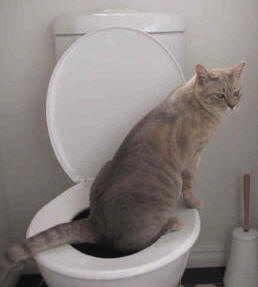Why You Should Never Flush Cat Poop Down Your Toilet - Critical Facts
Why You Should Never Flush Cat Poop Down Your Toilet - Critical Facts
Blog Article
We've stumbled upon this great article about Can You Flush Cat Poop Down The Toilet? directly below on the web and think it made sense to relate it with you on this site.

Intro
As pet cat proprietors, it's necessary to be mindful of exactly how we deal with our feline good friends' waste. While it might appear convenient to flush cat poop down the toilet, this practice can have harmful consequences for both the environment and human wellness.
Alternatives to Flushing
The good news is, there are much safer and much more responsible means to take care of cat poop. Consider the complying with alternatives:
1. Scoop and Dispose in Trash
One of the most common approach of disposing of feline poop is to scoop it right into a biodegradable bag and throw it in the garbage. Be sure to utilize a dedicated trash inside story and dispose of the waste immediately.
2. Usage Biodegradable Litter
Opt for naturally degradable pet cat litter made from products such as corn or wheat. These clutters are eco-friendly and can be safely dealt with in the garbage.
3. Bury in the Yard
If you have a yard, take into consideration hiding feline waste in an assigned location far from vegetable yards and water resources. Make certain to dig deep enough to prevent contamination of groundwater.
4. Set Up a Pet Waste Disposal System
Purchase a family pet garbage disposal system particularly created for pet cat waste. These systems utilize enzymes to break down the waste, minimizing odor and environmental impact.
Health Risks
Along with ecological worries, flushing feline waste can also pose wellness dangers to humans. Pet cat feces may contain Toxoplasma gondii, a bloodsucker that can trigger toxoplasmosis-- a potentially severe health problem, especially for expectant ladies and people with weakened body immune systems.
Environmental Impact
Purging cat poop introduces hazardous pathogens and parasites right into the supply of water, posturing a significant threat to aquatic ecological communities. These contaminants can negatively influence aquatic life and compromise water top quality.
Conclusion
Responsible animal possession expands past providing food and shelter-- it also involves appropriate waste monitoring. By refraining from flushing feline poop down the bathroom and selecting different disposal approaches, we can lessen our ecological impact and secure human health and wellness.
Why Can’t I Flush Cat Poop?
It Spreads a Parasite
Cats are frequently infected with a parasite called toxoplasma gondii. The parasite causes an infection called toxoplasmosis. It is usually harmless to cats. The parasite only uses cat poop as a host for its eggs. Otherwise, the cat’s immune system usually keeps the infection at low enough levels to maintain its own health. But it does not stop the develop of eggs. These eggs are tiny and surprisingly tough. They may survive for a year before they begin to grow. But that’s the problem.
Our wastewater system is not designed to deal with toxoplasmosis eggs. Instead, most eggs will flush from your toilet into sewers and wastewater management plants. After the sewage is treated for many other harmful things in it, it is typically released into local rivers, lakes, or oceans. Here, the toxoplasmosis eggs can find new hosts, including starfish, crabs, otters, and many other wildlife. For many, this is a significant risk to their health. Toxoplasmosis can also end up infecting water sources that are important for agriculture, which means our deer, pigs, and sheep can get infected too.
Is There Risk to Humans?
There can be a risk to human life from flushing cat poop down the toilet. If you do so, the parasites from your cat’s poop can end up in shellfish, game animals, or livestock. If this meat is then served raw or undercooked, the people who eat it can get sick.
In fact, according to the CDC, 40 million people in the United States are infected with toxoplasma gondii. They get it from exposure to infected seafood, or from some kind of cat poop contamination, like drinking from a stream that is contaminated or touching anything that has come into contact with cat poop. That includes just cleaning a cat litter box.
Most people who get infected with these parasites will not develop any symptoms. However, for pregnant women or for those with compromised immune systems, the parasite can cause severe health problems.
How to Handle Cat Poop
The best way to handle cat poop is actually to clean the box more often. The eggs that the parasite sheds will not become active until one to five days after the cat poops. That means that if you clean daily, you’re much less likely to come into direct contact with infectious eggs.
That said, always dispose of cat poop in the garbage and not down the toilet. Wash your hands before and after you clean the litter box, and bring the bag of poop right outside to your garbage bins.
https://trenchlesssolutionsusa.com/why-cant-i-flush-cat-poop/

Hopefully you enjoyed reading our article about Don’t flush cat feces down the toilet. Many thanks for finding the time to read our article. Those who appreciated our article kindly remember to share it. Many thanks for taking the time to read it.
Visit Report this page